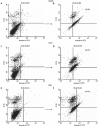New anti-proliferative agent, MK615, from Japanese apricot "Prunus mume" induces striking autophagy in colon cancer cells in vitro
- PMID: 18161921
- PMCID: PMC4611290
- DOI: 10.3748/wjg.v13.i48.6512
New anti-proliferative agent, MK615, from Japanese apricot "Prunus mume" induces striking autophagy in colon cancer cells in vitro
Abstract
Aim: To investigate the anti-neoplastic effects of MK615, an extract from the Japanese apricot (Prunus mume), against colon cancer cells.
Methods: Three colon cancer cell lines, SW480, COLO, and WiDr, were cultured with MK615. Growth inhibition was evaluated by cell proliferation assay and killing activity was determined by lactate dehydrogenase assay. Induction of apoptosis was evaluated by annexin V flow cytometry. Morphological changes were studied by light and electron microscopy, and immunofluorescence staining with Atg8.
Results: MK615 inhibited growth and lysed SW480, COLO and WiDr cells in a dose-dependent manner. Annexin V flow cytometry showed that MK615 induced apoptosis after 6 h incubation, at which point the occurrence of apoptotic cells was 68.0%, 65.7% and 64.7% for SW480, COLO, and WiDr cells, respectively. Light and electron microscopy, and immunofluorescence staining with Atg8 revealed that MK615 induced massive cytoplasmic vacuoles (autophagosomes) in all three cell lines.
Conclusion: MK615 has an anti-neoplastic effect against colon cancer cells. The effect may be exerted by induction of apoptosis and autophagy.
Figures






Similar articles
-
New antineoplastic agent, MK615, from UME (a Variety of) Japanese apricot inhibits growth of breast cancer cells in vitro.Breast J. 2007 Jan-Feb;13(1):44-9. doi: 10.1111/j.1524-4741.2006.00361.x. Breast J. 2007. PMID: 17214792
-
A novel anti-cancer substance, MK615, from ume, a variety of Japanese apricot, inhibits growth of hepatocellular carcinoma cells by suppressing Aurora A kinase activity.Hepatogastroenterology. 2007 Sep;54(78):1770-4. Hepatogastroenterology. 2007. PMID: 18019715
-
MK615 inhibits pancreatic cancer cell growth by dual inhibition of Aurora A and B kinases.World J Gastroenterol. 2008 Mar 7;14(9):1378-82. doi: 10.3748/wjg.14.1378. World J Gastroenterol. 2008. PMID: 18322951 Free PMC article.
-
Anticancer properties of Prunus mume extracts (Chinese plum, Japanese apricot).J Ethnopharmacol. 2020 Jan 10;246:112215. doi: 10.1016/j.jep.2019.112215. Epub 2019 Sep 3. J Ethnopharmacol. 2020. PMID: 31491438 Review.
-
A Review on Sources and Pharmacological Aspects of Sakuranetin.Nutrients. 2020 Feb 18;12(2):513. doi: 10.3390/nu12020513. Nutrients. 2020. PMID: 32085443 Free PMC article. Review.
Cited by
-
Efficacy of MK615 for the treatment of patients with liver disorders.World J Gastroenterol. 2012 Aug 21;18(31):4118-26. doi: 10.3748/wjg.v18.i31.4118. World J Gastroenterol. 2012. PMID: 22919243 Free PMC article. Clinical Trial.
-
In Vivo Antitumor Effects of MK615 Led by PD-L1 Downregulation.Integr Cancer Ther. 2018 Sep;17(3):646-653. doi: 10.1177/1534735418766403. Epub 2018 Apr 18. Integr Cancer Ther. 2018. PMID: 29665734 Free PMC article.
-
Macroautophagy: the key ingredient to a healthy diet?Autophagy. 2009 Feb;5(2):140-51. doi: 10.4161/auto.5.2.7529. Epub 2009 Feb 3. Autophagy. 2009. PMID: 19098459 Free PMC article. Review.
-
Advanced malignant melanoma responds to Prunus mume Sieb. Et Zucc (Ume) extract: Case report and in vitro study.Exp Ther Med. 2010 Jul;1(4):569-574. doi: 10.3892/etm_00000089. Epub 2010 Jul 1. Exp Ther Med. 2010. PMID: 22993577 Free PMC article.
-
Comprehensive Review of Phytochemical Constituents, Pharmacological Properties, and Clinical Applications of Prunus mume.Front Pharmacol. 2021 May 28;12:679378. doi: 10.3389/fphar.2021.679378. eCollection 2021. Front Pharmacol. 2021. PMID: 34122104 Free PMC article. Review.
References
-
- Adachi M, Suzuki Y, Mizuta T, Osawa T, Adachi T, Osaka K, Suzuki K, Shiojima K, Arai Y, Masuda K, et al. The Japanese apricot Prunus mume Sieb. et Zucc (Ume) is a rich natural source of novel anti-cancer substance. Int J Food Prop. 2007;10:375–384.
-
- Nakagawa A, Sawada T, Okada T, Ohsawa T, Adachi M, Kubota K. New antineoplastic agent, MK615, from UME (a Variety of) Japanese apricot inhibits growth of breast cancer cells in vitro. Breast J. 2007;13:44–49. - PubMed
-
- Terstriep S, Grothey A. First- and second-line therapy of metastatic colorectal cancer. Expert Rev Anticancer Ther. 2006;6:921–930. - PubMed
-
- Monga DK, O'Connell MJ. Surgical adjuvant therapy for colorectal cancer: current approaches and future directions. Ann Surg Oncol. 2006;13:1021–1034. - PubMed
-
- Penn LZ. Apoptosis modulators as cancer therapeutics. Curr Opin Investig Drugs. 2001;2:684–692. - PubMed
MeSH terms
Substances
LinkOut - more resources
Full Text Sources

